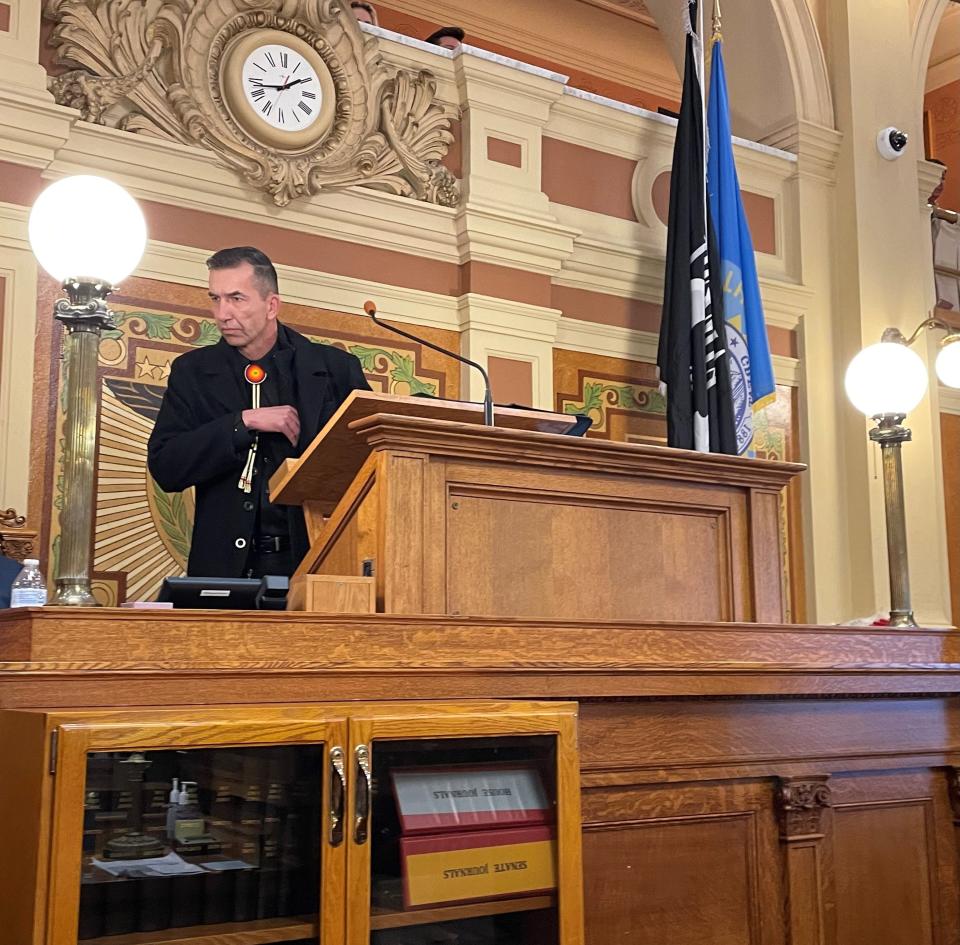Crow Creek Chairman calls for Oceti Sakowin history to remain part of social studies standards
Peter Lengkeek, the Hunkpati Oyate Tribal Chairman of the Crow Creek Sioux, told the 98th Session of the South Dakota Legislature on Thursday that without addressing the history of the Oceti Sakowin in state history, it's as if they're erasing a part of the state name.

"It is our indigenous people who put the Dakota in South Dakota," Lengkeek said.
Lengkeek's comments referenced the current discourse surrounding efforts to revise current South Dakota social studies standards, after an initial 2021 Department of Education draft removed more than a dozen references to the Oceti Sakowin. The removal was done without the consent of the majority-educator workgroup who worked on the draft and led to outcry among education and Indigenous communities.
The latest version of the draft, currently making its way around the state for public comment, included Indigenous representation on the workgroup that developed it and more references of Oceti Sakowin history than the first.
However, several Indigenous leaders opposed the draft in November, including Lengkeek; Brian Wagner, an education consultant for the Crow Creek Sioux Tribe and education director for the Lower Brule Sioux Tribe; and Kyrie Dunkley, vice president of the Indian Education Parent Committee in Sioux Falls. Wagner also said at the time that all nine tribes in South Dakota opposed the proposed social studies standards.
More:Time for 'truth and reconciliation' in South Dakota social studies standards, opponents say
"The future generations of South Dakota should not be robbed of this incredible story of resilience and rich history that has sustained our state and our territory," Lengkeek said Thursday, adding there are tribal members, educators, scholars and knowledge keepers who can help build social studies standards rather than relying on out-of-state sources who may be politically motivated.
During his 40-minute speech, Lengkeek also spoke to efforts South Dakota's Native American nations took during 2022 to address voter suppression, the epidemic of Missing and Murdered Indigenous People, the number of Native American children entering the foster care system and caring for the future of the Missouri River.
His comments were juxtaposed with laws passed by the 2022 Legislature banning trans girls from participating in school sports and banning Critical Race Theory, an academic theory that race is a social construction, and a battle over redistricting in Lyman County.
More:MMIP and human trafficking coordinators hired by South Dakota Attorney General's office
"We saw efforts to prioritize issues that we as tribal nations couldn't quite grasp as in meaning or pressing in nature," he said.
Overall, Lengkeek encouraged lawmakers to work together with tribal leaders to make decisions for the next seven generations.
"With all my being. I believe that we can build a more prosperous and meaningful relationship for our intertwined future," he said.
This article originally appeared on Sioux Falls Argus Leader: Crow Creek Chairman urges to keep Oceti Sakowin history as part of South Dakota

